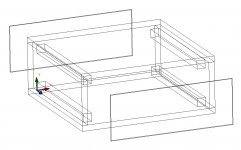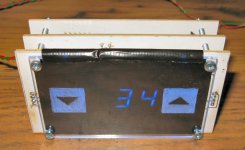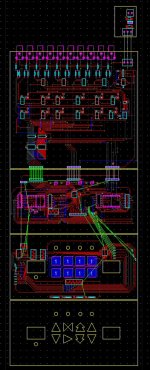Does DIY need a definition?
I guess if you haven't designed and built something from scratch then it can be an ambition to do so, it was for me, but in my case the something was a radio.
Don't sweat the small stuff.
It's all small stuff.
w
Agreed!
Peace,
Dave
It's for a relay switched attenuator, basically a rectangular wooden tube about 8 ins wide.

That's just a rough drawing. It's got touchsense controls + IR remote so it has a black perspex fascia like my volume contrpl.

It'll have some large square holes in the top and bottom covered with grills for ventilation.
These are the PCBs and fascia (obviously not to the same scale), you can see the big copper squares which are the touchsense sensors

w

That's just a rough drawing. It's got touchsense controls + IR remote so it has a black perspex fascia like my volume contrpl.

It'll have some large square holes in the top and bottom covered with grills for ventilation.
These are the PCBs and fascia (obviously not to the same scale), you can see the big copper squares which are the touchsense sensors

w
What's your definition of DIY? Not intending to start a flame war or put down anyone else's efforts, just curious about how other people view this.
Building a kit? (Someone else's design, and all the pieces and parts are provided, all you do is the assembly.)
Building someone else's design, from a book, the internet, wherever.
Your own design, your own fabrication?
Where do you draw the line? No, it really doesn't matter. What counts is whatever gives you the personal satisfaction. I'm just curious about what DIY means to others.
Kits have been considered DIY for many decades. I remember assembling Dynaco and Eico kits with my father when I was a pre-adolescent. I still assemble kits and modify them in the process, speaker kits used with miniDSPs. Now I am mixing and matching components, i.e. different tweeters used with the woofers and of course active crossovers. Even the assembled miniDSPs are referred to as "kits." Of course those who design their own circuitry and then put it together are at a more advanced level and I am envious of them, but I remain proud of the achievement that my speakers represent.
Kits are great because the parts are documented and there are (dis)assembly drawings, making the unit easy to modify, and it's generally easier to modify something than to make a desired design from scratch.
I recall several "POOGE" articles on modifying designs in the old Audio Amateur magazine. This brings up yet another possible "Is it really DIY?" question: Is it DIY if you don't know anything about the design, or even electronics at all, but "blindly" follow a modification given in a book, magazine article or webpage?
I recall several "POOGE" articles on modifying designs in the old Audio Amateur magazine. This brings up yet another possible "Is it really DIY?" question: Is it DIY if you don't know anything about the design, or even electronics at all, but "blindly" follow a modification given in a book, magazine article or webpage?
Although understanding it is good, and designing it yourself is even better, I think we have to accept that the D in DIY stands for Do. That means that, strictly, if you design something then get someone else to build it (like modern artists often seem to do, as they don't know how to weld etc.) then you have not done DIY (although your builder has).
This may be quite a dispute ...although it isn't ! It's a no-nonsense 
Also ,for the designer of the project (engineer) it is of great reward if many build it . I read also a statement of a good speaker designer who clearly admits that he couldn't reach or didn't have the skills of a carpenter , but he wanted his creatures to have a beautiful finish , so...
By any means necessary !!!
Also ,for the designer of the project (engineer) it is of great reward if many build it . I read also a statement of a good speaker designer who clearly admits that he couldn't reach or didn't have the skills of a carpenter , but he wanted his creatures to have a beautiful finish , so...
By any means necessary !!!
Kits are great because the parts are documented and there are (dis)assembly drawings, making the unit easy to modify, and it's generally easier to modify something than to make a desired design from scratch.
I recall several "POOGE" articles on modifying designs in the old Audio Amateur magazine. This brings up yet another possible "Is it really DIY?" question: Is it DIY if you don't know anything about the design, or even electronics at all, but "blindly" follow a modification given in a book, magazine article or webpage?
Nearly all of the greatest artist's started as an apprentice to a master craftsman, so it would appear that emulating others while developing your own, unique approach, was not only expected, but approved.
Building something (like a kit) is a great beginning. It also tends to build confidence, while allowing you to become acquainted with the approach, that those who have accumulated knowledge over many decades, favour.
Has anyone here sprung from the head of Zeus, fully formed and developed?
Although few, if any of us, remembers their own first attempts to walk as infants, that may well have been one of an individual's greatest accomplishments in life and can be credited as being, perhaps, the foundational beginnings of much that followed later.
DIY, in it's many forms, are just steps in the journey to one's own destination.
Best Regards,
TerryO
Nearly all of the greatest artist's started as an apprentice to a master craftsman, so it would appear that emulating others while developing your own, unique approach, was not only expected, but approved.
Well put! Thanks TerryO.
I did not design my house. Nor did I build it. But I've done quite a lot of fixing, upgrading, and remodeling myself. (not to mention yard work
I enjoyed it too!
lets not go off into elitist territory and marginalize those that may be less capable or knowledgeable...

for me DIY means..
creating or adding modifications to something to suit my own and selfish personal needs.
Actualy even if i would change a sticker from sony to fony, it would be diy if you ask me.
even if the sticker was purchased.
modding, yes it should be called like that.
but i consider modding a form of diy.
What i do not consider to be DIY, is when someone has a bruminghdale machine,
the carpets ordered from Sizaly, the gear levers from Absurdistan, it all gets assembled in Surrealistan, it has a Barien kichen sink, and the proud owner never even een the parts, not even ever touch them, just order the stuff and get it done by someone else, then the owner gets it allready assembled and ready to use.
thats not DIY at all.
If it yields something done by the owner, that makes it in any way non-"stock" or standard, its DIY. If it is a copy of something standard done y the owner, its still DIY. After all, it was done by himself.
Obtainig a copy of something from someone is not DIY.
creating or adding modifications to something to suit my own and selfish personal needs.
Actualy even if i would change a sticker from sony to fony, it would be diy if you ask me.
even if the sticker was purchased.
modding, yes it should be called like that.
but i consider modding a form of diy.
What i do not consider to be DIY, is when someone has a bruminghdale machine,
the carpets ordered from Sizaly, the gear levers from Absurdistan, it all gets assembled in Surrealistan, it has a Barien kichen sink, and the proud owner never even een the parts, not even ever touch them, just order the stuff and get it done by someone else, then the owner gets it allready assembled and ready to use.
thats not DIY at all.
If it yields something done by the owner, that makes it in any way non-"stock" or standard, its DIY. If it is a copy of something standard done y the owner, its still DIY. After all, it was done by himself.
Obtainig a copy of something from someone is not DIY.
~~~~~~~~~~~~~~~~snip~~~~~~~~~~~
lets not go off into elitist territory and marginalize those that may be less capable or knowledgeable...

eclectic,
Thanks for sticking up for me!
Best Regards,
TerryO
lets not go off into elitist territory and marginalize those that may be less capable or knowledgeable...
We all have to start somewhere. For me it started when the paper clip met the wall outlet at age 5. Been blowing stuff up ever since.
If you Do It in the quest for knowledge it is DIY even if it never works. It has been stated that "voiding warantees" is DIY. If you buy a brand new widget, take it apart just to see how it works, is it DIY? Well something was Done, and it was done by You, so ......
We all have to start somewhere. For me it started when the paper clip met the wall outlet at age 5. Been blowing stuff up ever since.
If you Do It in the quest for knowledge it is DIY even if it never works. It has been stated that "voiding warantees" is DIY. If you buy a brand new widget, take it apart just to see how it works, is it DIY? Well something was Done, and it was done by You, so ......
That reminds me of the story I heard many years ago about Dr. Salk, the inventor of the Polio Vaccine.
Evidently he was being interviewed about his work and the interviewer asked: "After 59 (#?) failed experiments didn't you get discouraged?"
Dr. Salk replied that he never had an experiment that failed, as each one taught him something that he needed to know, in order to reach a successful conclusion.
OTOH: If at first you don't succeed, don't take up skydiving!
Best Regards,
TerryO
I have sometimes been tempted to ask my brother-in-law to do some woodwork for me, as he is a good carpenter and I am rubbish. If I do the innards and he does the box, then both are DIY although not by the same person. Could we call that teamwork DIY or family DIY?
If I took up carpentry I'd cut my fingers off (I do have a movement disorder), given that I have modified the size of some cabinets mounting holes and messed with all the parts, measuring along the way and come up with whole new speakers using cabinets built by someone else. I know all this sounds distinctively unfeminine but its a small but gratifying part of me that wouldn't go away.
Last edited:
If I took up carpentry I'd cut my fingers off (I do have a movement disorder), given that I have modified the size of some cabinets mounting holes and messed with all the parts, measuring along the way and come up with whole new speakers using cabinets built by someone else. I know all this sounds distinctively unfeminine but its a small but gratifying part of me that wouldn't go away.
Certainly sounds like it qualifies to me. You are a rare lady indeed!
Many of us have womenfolk in our lives who are intolerant of the hobby, then there are guys like me who chose exceptionally well (or had different priorities) and have full or near-full acceptance. I've heard stories of men who are encouraged to build speakers by their wives/girlfriends, but I'm not convinced, sounds like Nessie to me.
I think defining DIY is rather futile. If you're working to understand the science of the hobby more, I'd be willing to give partial "DIY" credit even if you're not soldering or woodworking or anything.
Interesting to read everyone's thoughts. After reading all of the responses and thinking about it a bit, I guess for me it comes down to multiple definitions of "DIY".
The first is "Do It Yourself": I started at a young age building Heathkits and many other experiments. Those were great learning experiences, mainly in how to solder and follow instructions. In college I was poor so I had to fix the car myself. Even today I DIY, doing electrical or plumbing projects around the house, etc. After remodeling multiple houses I'm pretty good at both of those. But I don't find building a kit any more satisfying than putting together something from Ikea. Building a "gainclone" is just hooking up the wires.
My second definition is "Design It Yourself." The first amp I built was a P3A, someone else's electrical design though my own implementation of the pcb layout. Even though it was a great learning experience, somehow it wasn't quite satisfying. I couldn't say it was "mine." So I started learning design, reading, researching, learning tools like Speaker Workshop and LTspice.
The third definition is what I find most satisfying: the combination of Design It Yourself and Do It Yourself. Various projects - a set of speakers, a subwoofer plus the mixer/LPF/level adjustment, and a new amplifier project currently underway have been my design, and my implementation. Of course I used design tools and components created by someone else, and relied on others for inspiration or a starting point for developing the design. Learning Speaker Workshop, building the jigs and measuring the drivers, designing the cabinet and crossovers, cutting the wood, buying the router bits and building the cabinets, tracking down the hardware, bringing it all together. Learning LTspice and simulating the circuits, learning Eagle and doing the pcb layouts, etching, and assembling the pcbs, being able to say that it's my design, and I built it. That's what DIY means to me.
My talents and skill in many areas are crude compared to many others on this forum. I thank the many from whom I have learned so much.
The first is "Do It Yourself": I started at a young age building Heathkits and many other experiments. Those were great learning experiences, mainly in how to solder and follow instructions. In college I was poor so I had to fix the car myself. Even today I DIY, doing electrical or plumbing projects around the house, etc. After remodeling multiple houses I'm pretty good at both of those. But I don't find building a kit any more satisfying than putting together something from Ikea. Building a "gainclone" is just hooking up the wires.
My second definition is "Design It Yourself." The first amp I built was a P3A, someone else's electrical design though my own implementation of the pcb layout. Even though it was a great learning experience, somehow it wasn't quite satisfying. I couldn't say it was "mine." So I started learning design, reading, researching, learning tools like Speaker Workshop and LTspice.
The third definition is what I find most satisfying: the combination of Design It Yourself and Do It Yourself. Various projects - a set of speakers, a subwoofer plus the mixer/LPF/level adjustment, and a new amplifier project currently underway have been my design, and my implementation. Of course I used design tools and components created by someone else, and relied on others for inspiration or a starting point for developing the design. Learning Speaker Workshop, building the jigs and measuring the drivers, designing the cabinet and crossovers, cutting the wood, buying the router bits and building the cabinets, tracking down the hardware, bringing it all together. Learning LTspice and simulating the circuits, learning Eagle and doing the pcb layouts, etching, and assembling the pcbs, being able to say that it's my design, and I built it. That's what DIY means to me.
My talents and skill in many areas are crude compared to many others on this forum. I thank the many from whom I have learned so much.
- Status
- This old topic is closed. If you want to reopen this topic, contact a moderator using the "Report Post" button.
- Home
- Member Areas
- The Lounge
- What's your definition of DIY?